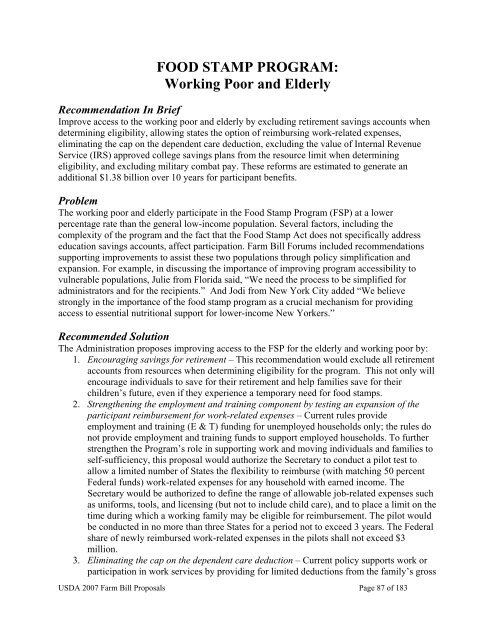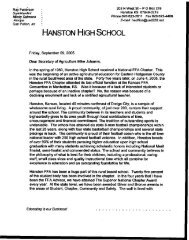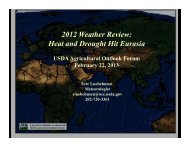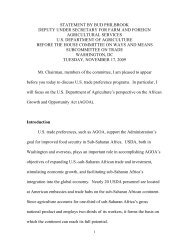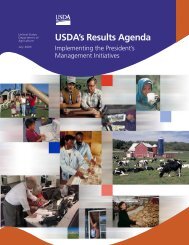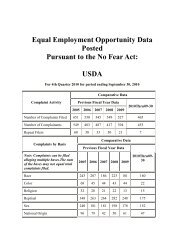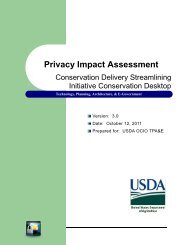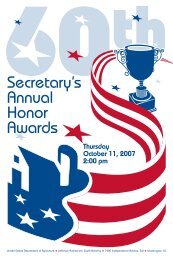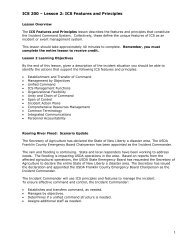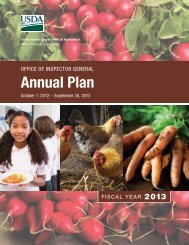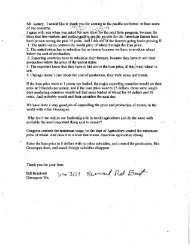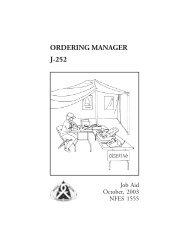USDA 2007 Farm Bill Proposals - US Department of Agriculture
USDA 2007 Farm Bill Proposals - US Department of Agriculture
USDA 2007 Farm Bill Proposals - US Department of Agriculture
You also want an ePaper? Increase the reach of your titles
YUMPU automatically turns print PDFs into web optimized ePapers that Google loves.
FOOD STAMP PROGRAM:Working Poor and ElderlyRecommendation In BriefImprove access to the working poor and elderly by excluding retirement savings accounts whendetermining eligibility, allowing states the option <strong>of</strong> reimbursing work-related expenses,eliminating the cap on the dependent care deduction, excluding the value <strong>of</strong> Internal RevenueService (IRS) approved college savings plans from the resource limit when determiningeligibility, and excluding military combat pay. These reforms are estimated to generate anadditional $1.38 billion over 10 years for participant benefits.ProblemThe working poor and elderly participate in the Food Stamp Program (FSP) at a lowerpercentage rate than the general low-income population. Several factors, including thecomplexity <strong>of</strong> the program and the fact that the Food Stamp Act does not specifically addresseducation savings accounts, affect participation. <strong>Farm</strong> <strong>Bill</strong> Forums included recommendationssupporting improvements to assist these two populations through policy simplification andexpansion. For example, in discussing the importance <strong>of</strong> improving program accessibility tovulnerable populations, Julie from Florida said, “We need the process to be simplified foradministrators and for the recipients.” And Jodi from New York City added “We believestrongly in the importance <strong>of</strong> the food stamp program as a crucial mechanism for providingaccess to essential nutritional support for lower-income New Yorkers.”Recommended SolutionThe Administration proposes improving access to the FSP for the elderly and working poor by:1. Encouraging savings for retirement – This recommendation would exclude all retirementaccounts from resources when determining eligibility for the program. This not only willencourage individuals to save for their retirement and help families save for theirchildren’s future, even if they experience a temporary need for food stamps.2. Strengthening the employment and training component by testing an expansion <strong>of</strong> theparticipant reimbursement for work-related expenses – Current rules provideemployment and training (E & T) funding for unemployed households only; the rules donot provide employment and training funds to support employed households. To furtherstrengthen the Program’s role in supporting work and moving individuals and families toself-sufficiency, this proposal would authorize the Secretary to conduct a pilot test toallow a limited number <strong>of</strong> States the flexibility to reimburse (with matching 50 percentFederal funds) work-related expenses for any household with earned income. TheSecretary would be authorized to define the range <strong>of</strong> allowable job-related expenses suchas uniforms, tools, and licensing (but not to include child care), and to place a limit on thetime during which a working family may be eligible for reimbursement. The pilot wouldbe conducted in no more than three States for a period not to exceed 3 years. The Federalshare <strong>of</strong> newly reimbursed work-related expenses in the pilots shall not exceed $3million.3. Eliminating the cap on the dependent care deduction – Current policy supports work orparticipation in work services by providing for limited deductions from the family’s gross<strong><strong>US</strong>DA</strong> <strong>2007</strong> <strong>Farm</strong> <strong>Bill</strong> <strong>Proposals</strong> Page 87 <strong>of</strong> 183


